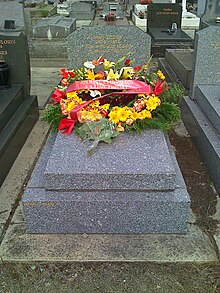
Quick Facts
Biography
Lev Lvovich Sedov (Russian: Лев Львович Седов, also known as Leon Sedov; 24 February 1906 – 16 February 1938) was the son of the Russian Communist leader Leon Trotsky and his second wife Natalia Sedova. He was born when his father was in prison facing life imprisonment for having participated in the first Soviet Revolution of 1905.
Life
He lived separately from his parents after the October Revolution in order not to be seen as privileged. He married in 1925 at the age of 19, and had a son, Lev, the following year. In 1935-1939, while in Paris, Sedov and his partner, Jeanne Martin, also took in and cared for his young nephew, Vsevolod Volkov, called "Sieva" by the family (and who later, in Mexico, took the name Esteban Volkov), the son of Sedov's late half-sister, Zina.
Sedov supported his father in the struggle against Joseph Stalin and became a leader of the Trotskyist movement in his own right. He accompanied his parents into exile in 1929, and then moved to Berlin in 1931. Just before Hitler came to power in 1933, Sedov was able to move to Paris where he went to work as a Parisian laborer and became an important activist in the Trotskyist movement. He was frequently followed by agents of the Soviet NKVD.
Death

After an acute attack of appendicitis in February 1938, Mark Zborowski, an NKVD agent who had posed as Sedov’s comrade and friend, arranged to take him to a private clinic instead of a Paris hospital. At the same time, Zborowski notified the NKVD that Sedov had been transported under an assumed name to the Clinique Mirabeau, which was itself, operated by a White Russian with connections to Soviet intelligence, who performed an appendectomy. Complications set in after the operation, but Sedov apparently received no further treatment. He was later taken to a Paris hospital, where he died.
Some historians who have analyzed the matter believe Sedov was murdered by agents of Stalin who were in Paris watching him, either while in hospital or by poisoning him causing his condition. In 1994, Pavel Sudoplatov, a lieutenant general in the NKVD who at that time was in charge of planning assassinations abroad, including the one of Sedov's father, claimed in his memoirs, Special Tasks, that Soviet agents played no part in his death. However, in 1956, Zborowski himself had testified before a United States Senate subcommittee that he had contacted the NKVD to report that Sedov had entered the clinic, and then to confirm his death.
Sedov's grave is in Cimetière de Thiais, south of Paris.
Writings
Lev Sedov's major political work is The Red Book on the Moscow Trials (1936). At a time when a leftist consensus accepted the verdicts of the Moscow trials, this book analyzed them with the aim of discrediting them. It was the first thorough-going exposé of the frame-ups upon which the trials were based. Trotsky himself described it as a "priceless gift... the first crushing reply to the Kremlin falsifiers."
